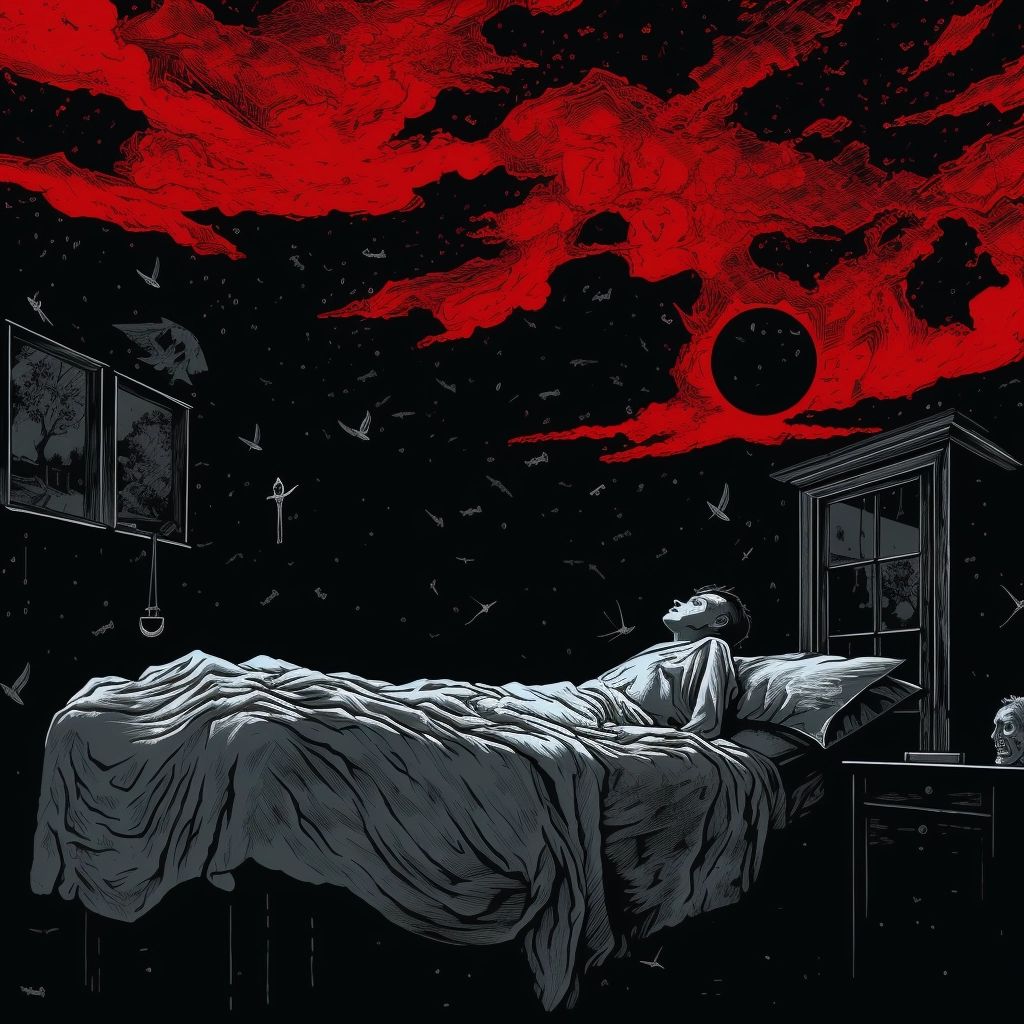PTSD Nightmares: Overcoming Nightmares and Sleep Disturbances in PTSD

PTSD nightmares are vivid and distressing dreams experienced by individuals who suffer from Post-Traumatic Stress Disorder (PTSD). PTSD is a mental health condition that can develop after experiencing or witnessing a traumatic event, such as combat, physical or sexual assault, natural disasters, or accidents. The nightmares associated with PTSD are often characterized by the re-experiencing of the traumatic event, leading to intense emotions, fear, and anxiety during sleep.
In the following sections, we will explore the neurobiological factors contributing to PTSD nightmares and delve into evidence-based approaches for coping with and managing this distressing symptom. Understanding the underlying mechanisms and available treatments is crucial in offering support to those suffering from PTSD nightmares and helping them on their path to recovery.
What is PTSD?
Post-Traumatic Stress Disorder (PTSD) is a mental health condition that can develop after experiencing or witnessing a traumatic event. Traumatic events that can trigger PTSD include combat exposure, physical or sexual assault, natural disasters, serious accidents, and other life-threatening situations. According to the Diagnostic and Statistical Manual of Mental Disorders (DSM-5), the primary criteria for diagnosing PTSD include exposure to a traumatic event, the presence of intrusive symptoms, avoidance behaviors, negative alterations in mood and cognition, and alterations in arousal and reactivity lasting for at least one month (American Psychiatric Association, 2013).

Common Causes and Triggers of PTSD
PTSD can result from a wide range of traumatic experiences, and the response to trauma varies from person to person. Combat veterans may develop PTSD due to intense and prolonged exposure to life-threatening situations. Survivors of physical or sexual assault may experience the condition due to the profound violation of personal safety and trust. Natural disasters, accidents, and witnessing violence can also lead to PTSD in affected individuals.
Numerous studies have examined the association between specific types of trauma and the development of PTSD. For instance, a meta-analysis by Ozer et al. (2003) found that sexual assault and combat exposure were among the most strongly associated with the development of PTSD. Furthermore, research has shown that the number of traumatic events experienced is positively correlated with the likelihood of developing PTSD (Breslau et al., 1998).
Symptoms and Impact on Mental Health

Individuals with PTSD often experience a range of distressing symptoms, including intrusive thoughts and memories related to the traumatic event. Nightmares are a hallmark symptom of PTSD, with up to 71% of individuals experiencing PTSD reporting nightmares regularly (Spoormaker et al., 2003). These nightmares can be extremely vivid and disturbing, leading to sleep disturbances and fear of falling asleep.Other common symptoms of PTSD include hypervigilance, irritability, and exaggerated startle response. Individuals may also avoid reminders of the trauma, such as people, places, or activities that trigger distressing memories. Avoidance behaviors can significantly impact daily life, as individuals may withdraw from social interactions and isolate themselves.
The impact of PTSD on mental health can be profound, leading to a reduced quality of life, impaired functioning, and a higher risk of developing comorbid conditions like depression and substance use disorders (Kessler et al., 2005). Effective interventions for PTSD, including addressing PTSD nightmares, are essential in helping individuals regain control over their lives and achieve a sense of recovery and well-being.
| Suggestion: PTSD Acute Vs. Chronic: Differences Between Acute and Chronic PTSD
The Link Between PTSD and Nightmares
PTSD nightmares are a direct manifestation of the profound impact trauma has on the brain’s processing of memories and emotions. Traumatic events leave a lasting impression on an individual’s mind, and during sleep, the brain attempts to process and consolidate these memories. However, in the case of PTSD, the processing of traumatic memories becomes disrupted, leading to the intrusion of distressing and vivid nightmares during the REM (Rapid Eye Movement) stage of sleep.
Research by van Liempt et al. (2013) suggests that PTSD nightmares often involve the re-experiencing of traumatic events, resulting in intense emotions such as fear, helplessness, and horror. These nightmares can be recurring and may vary in intensity, but they share the common theme of representing unresolved trauma.
Dive into the chilling realm of PTSD Nightmares and unravel the haunting question:
Can nightmares cause trauma?
Uncover the profound connection between the two in our thought-provoking article.
Brace yourself for a gripping exploration of the mind’s darkest corners.
Click “Can nightmares cause trauma?” to venture into the depths of the human psyche, where dreams meet reality, and discover the lasting impact of haunting dreams.
Unveil the truth behind the enigmatic link between PTSD Nightmares and trauma, a journey that will leave you enlightened and captivated.

Neurobiological Factors Contributing to PTSD Nightmares
The occurrence of PTSD nightmares is closely linked to specific neurobiological factors within the brain. Studies have identified alterations in the amygdala, hippocampus, and prefrontal cortex as key contributors to the development of PTSD nightmares.
The amygdala, responsible for processing emotions and fear responses, becomes hyperactive in individuals with PTSD, leading to heightened emotional reactions during nightmares (Rasch et al., 2009). Meanwhile, the hippocampus, responsible for memory consolidation, can be adversely affected by trauma, impacting the brain’s ability to process memories effectively. This disruption in the hippocampus-amygdala circuitry can contribute to the re-experiencing of traumatic memories during nightmares.
Moreover, alterations in the prefrontal cortex, which plays a role in emotional regulation and cognitive processing, have been observed in individuals with PTSD. A study by Shin et al. (2006) found that the prefrontal cortex’s reduced activity in PTSD patients was associated with increased emotional arousal and the persistence of intrusive memories, including nightmares.
| Suggestion: Ongoing Traumatic Relationship Syndrome
How Nightmares Affect Sleep Quality and Overall Well-being
PTSD dreams can significantly disrupt sleep quality and contribute to the development of sleep disorders. Nightmares during the REM stage of sleep can lead to frequent awakenings and difficulty in falling back asleep, causing fragmented and unrestful sleep (van Liempt et al., 2013). This disruption can result in chronic sleep deprivation, leading to daytime fatigue, irritability, and difficulties with concentration and memory (Koffel et al., 2016).
Furthermore, the emotional distress caused by PTSD nightmares can exacerbate other PTSD symptoms, leading to increased anxiety, hypervigilance, and avoidance behaviors. Nightmares can perpetuate a cycle of retraumatization, as they constantly remind individuals of their traumatic experiences, making it challenging to move forward in the healing process.
Addressing PTSD nightmares through evidence-based treatments and coping strategies is vital to improving sleep quality, reducing emotional distress, and enhancing overall well-being for individuals with PTSD. In the next section, we will explore how to treat PTSD nightmares to promote healing and recovery.
Also Might be Interesting…
Psychological Impact of PTSD Nightmares
PTSD nightmares can perpetuate a cycle of recurring trauma and retraumatization for individuals who have experienced traumatic events. During nightmares, individuals may vividly relive the traumatic incident, experiencing the same emotions, fear, and helplessness they felt during the actual event. Research has shown that these intrusive nightmares can reinforce the trauma’s emotional impact, making it challenging for individuals to distance themselves from the distressing memories (van Liempt et al., 2013).
The experience of retraumatization through PTSD nightmares can hinder the healing process and delay recovery. It can also lead to increased avoidance behaviors, as individuals may avoid situations or triggers associated with the traumatic event to prevent the recurrence of nightmares.

Disrupting Daily Life and Functioning
PTSD nightmares can have a profound impact on an individual’s daily life and functioning. The sleep disturbances caused by recurring nightmares can result in chronic sleep deprivation and fatigue. Sleep deprivation, in turn, impairs cognitive function, emotional regulation, and overall well-being.
The fear of experiencing nightmares can also lead to sleep avoidance, where individuals intentionally stay awake or resist falling asleep to prevent nightmares from occurring. Sleep avoidance can further exacerbate sleep disturbances, perpetuating the cycle of sleep disruption and emotional distress.
The disruptions caused by PTSD nightmares can interfere with work, school, and interpersonal relationships. Individuals may experience difficulties with concentration, memory, and decision-making due to chronic sleep disturbances and emotional distress.
Emotional and Cognitive Implications
Emotionally, PTSD dreams can trigger intense feelings of fear, anxiety, and helplessness. The emotional intensity experienced during nightmares can linger upon waking, impacting an individual’s mood throughout the day. This emotional dysregulation can lead to heightened sensitivity to stressors and increased irritability.
Cognitively, the distressing content of PTSD nightmares can intrude into an individual’s waking thoughts, affecting their ability to focus on daily tasks and activities. Intrusive memories from nightmares may be triggered by similar environmental cues, leading to a state of hypervigilance and avoidance.
Moreover, the emotional and cognitive implications of PTSD nightmares can perpetuate negative thought patterns and beliefs related to the traumatic event, making it challenging for individuals to challenge and reframe these beliefs.
It is crucial to address the psychological impact of PTSD nightmares through appropriate therapeutic interventions and coping strategies. In the next section, we will explore evidence-based approaches for managing PTSD nightmares and improving the overall well-being of those affected by this distressing symptom.
How To Overcome PTSD Nightmares
Here are some PTSD nightmares treatments:

Professional Help and Therapy Options
- Cognitive-Behavioral Therapy (CBT): Cognitive-Behavioral Therapy (CBT) is a widely recognized and effective therapeutic approach for treating PTSD nightmares. CBT aims to identify and modify negative thought patterns and behaviors associated with trauma. In the context of PTSD nightmares, CBT helps individuals challenge the distressing beliefs triggered by nightmares and develop healthier coping strategies. Research has demonstrated the effectiveness of CBT in reducing PTSD nightmares and improving sleep quality. A study by Forbes et al. (2001) found that CBT significantly reduced nightmare frequency and improved overall sleep patterns in individuals with PTSD.
- Eye Movement Desensitization and Reprocessing (EMDR): EMDR is another evidence-based therapy commonly used to treat PTSD nightmares. This therapy involves guided eye movements while individuals recall distressing memories, helping them process traumatic experiences and reduce their emotional impact. Several studies have indicated the efficacy of EMDR in alleviating PTSD symptoms, including nightmares. For example, a meta-analysis by Bisson et al. (2013) demonstrated that EMDR was effective in reducing nightmares and other PTSD symptoms.
- Exposure Therapy: Exposure Therapy involves gradually and safely confronting traumatic memories or triggers associated with nightmares. By systematically facing these distressing stimuli, individuals can learn to reduce their anxiety and emotional response over time. Exposure Therapy has shown promising results in reducing PTSD nightmares. A study by Jaycox et al. (1998) found that exposure-based treatments were effective in decreasing nightmares and improving overall PTSD symptomatology.
Self-Help Techniques and Strategies
- Relaxation Techniques (e.g., Deep Breathing, Meditation): Practicing relaxation techniques can help individuals manage stress and anxiety associated with PTSD nightmares. Deep breathing exercises, progressive muscle relaxation, and meditation can promote a sense of calm and relaxation, making it easier to fall asleep and reduce the frequency of nightmares.
- Establishing a Bedtime Routine: Creating a consistent bedtime routine can signal to the body that it is time to wind down and prepare for sleep. Engaging in relaxing activities before bedtime, such as reading or taking a warm bath, can improve sleep quality and reduce the likelihood of nightmares.
- Creative Expression (e.g., Journaling, Art Therapy): Engaging in creative expression, such as journaling or art therapy, can provide a healthy outlet for processing emotions related to trauma. Expressive writing and art have been found to have therapeutic benefits in managing PTSD symptoms and improving emotional well-being (Sloan et al., 2012).
- Gradual Exposure to Triggers: Working with a therapist, individuals can gradually confront triggers related to their nightmares in a controlled and safe manner. Gradual exposure can help desensitize the emotional response to these triggers and reduce their impact on sleep and daily life.
PTSD Nightmares Medication and Its Role in Managing PTSD Nightmares

Medication can be prescribed by healthcare professionals to manage PTSD nightmares, especially when other therapeutic approaches have not provided sufficient relief. Certain antidepressant medications, such as selective serotonin reuptake inhibitors (SSRIs), have been shown to help reduce nightmares and improve overall PTSD symptomatology (Raskind et al., 2013).
However, it’s essential to note that medication should be used as part of a comprehensive treatment plan, and its potential benefits and risks should be carefully evaluated by a qualified healthcare provider.
Lifestyle Changes for Managing PTSD Nightmares
Maintaining a Healthy Sleep Environment
Creating a conducive sleep environment is crucial for managing PTSD nightmares and promoting restful sleep. Here are some tips to improve the sleep environment:
- Comfortable Bedding: Invest in a comfortable mattress and pillows that support a good sleeping posture.
- Eliminate Distractions: Keep the bedroom free from electronic devices and other distractions that may interfere with sleep.
- Dim Lighting: Use soft, dim lighting in the evening to signal the body to prepare for sleep.
- Temperature Control: Maintain a comfortable room temperature to prevent disruptions to sleep caused by being too hot or too cold.
Research supports the importance of a healthy sleep environment in managing PTSD nightmares. Studies have shown that environmental factors, such as bedroom comfort and temperature, play a significant role in sleep quality (Stephens et al., 2015).
Regular Exercise and Its Impact on Sleep
Engaging in regular physical activity can have a positive impact on sleep quality and reduce the frequency of nightmares. Exercise helps reduce stress and anxiety, which are often triggers for PTSD nightmares. However, it’s essential to avoid vigorous exercise close to bedtime, as it may lead to difficulty falling asleep.
Research indicates that regular physical activity is associated with better sleep quality and reduced symptoms of insomnia (Reid et al., 2010). Exercise has also been shown to have beneficial effects on mental health, reducing symptoms of depression and anxiety (Schuch et al., 2016), which can be comorbid with PTSD.

Nutrition and Its Connection to Mental Well-being

Maintaining a balanced and nutritious diet is essential for mental well-being and can have a positive impact on managing PTSD nightmares. Certain nutrients, such as omega-3 fatty acids, antioxidants, and B vitamins, are linked to improved mental health and cognitive function.
Research suggests that dietary patterns rich in fruits, vegetables, whole grains, and lean proteins are associated with a reduced risk of developing mood disorders (Opie et al., 2015). On the other hand, diets high in processed foods and added sugars may increase the risk of mood disturbances and negatively impact sleep quality.
Limiting Alcohol, Caffeine, and Substance Use
Alcohol, caffeine, and certain substances can disrupt sleep patterns and worsen nightmares. While alcohol may initially induce drowsiness, it can disrupt the REM stage of sleep, leading to more frequent and intense nightmares.Caffeine, a stimulant found in coffee, tea, and some soft drinks, can interfere with falling asleep and contribute to sleep disturbances, including nightmares.Substance use, including recreational drugs and certain prescription medications, can also affect sleep quality and exacerbate PTSD nightmares.

Limiting the consumption of alcohol, caffeine, and substances can help improve sleep quality and reduce the impact of nightmares on daily life.
| Read More: Self-Care Practices for Individuals with PTSD & CPTSD
HealWiser’s Last Piece of Advice
PTSD nightmares can be challenging, but they are manageable with the right resources and support. By addressing the psychological impact, seeking professional help, and adopting effective coping strategies, individuals can pave the way to healing, resilience, and a brighter future.
Remember, you are not alone, and help is available for those navigating the complexities of PTSD nightmares. Together, we can work towards a world where the burdens of trauma are eased, and individuals can lead fulfilling lives beyond their nightmares.
Sharing your experiences can provide valuable insights and emotional support. So…
…share your experience with Heal Wiser and others in the comments section below this post.





